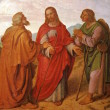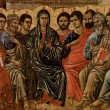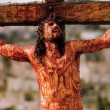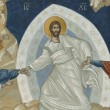How to Prove that Transcendentalism is True
by Dr. Peter Kreeft
Filed under Belief

Editor's Note: This is a follow-up piece to Dr. Peter Kreeft's article from earlier in the week titled "Why Reality Includes More (Not Less) Than You Probably Think". Be sure to read that one first. Merely refuting reductionism does not yet give us any positive evidence for transcendentalism, however, just as merely refuting atheism does not give you positive evidence for theism. We might well be stuck in agnosticism, unable to prove either of the two contradictory propositions, that... Read More
Why Reality Includes More (Not Less) Than You May Think
by Dr. Peter Kreeft
Filed under Belief

The most usual position among philosophers in the Western world today, in fact the most usual position among academics generally, is some kind of reductionism. By “reductionism” I mean simply the belief that the world-view, or implicit metaphysics, of most people, or ordinary people, especially people of previous eras and cultures, errs by believing too much; that Hamlet’s Shakespeare was exactly wrong when he said to Horatio that “there are more things in heaven and earth than are dreamed... Read More
Answering 5 More Common Objections to the Resurrection
by Dr. Peter Kreeft
Filed under The Resurrection

NOTE: Christians around the world celebrated Good Friday and Easter last week, which commemorate the death and resurrection of Jesus Christ. Thus we began a six-part series on these events by Dr. Peter Kreeft in which he examines each of the plausible theories attempting to explain what happened to Jesus at the end of his life, particularly whether he rose from the dead. Part 1 - 5 Possible Theories that Explain the Resurrection of Jesus Part 2 - Rejecting the Swoon Theory: 9 Reasons Why Jesus... Read More
Real Encounter: 13 Reasons Jesus’ Disciples Did Not Hallucinate
by Dr. Peter Kreeft
Filed under The Resurrection

NOTE: Christians around the world celebrated Good Friday and Easter last week, which commemorate the death and resurrection of Jesus Christ. Thus we began a six-part series on these events by Dr. Peter Kreeft in which he examines each of the plausible theories attempting to explain what happened to Jesus at the end of his life, particularly whether he rose from the dead. Part 1 - 5 Possible Theories that Explain the Resurrection of Jesus Part 2 - Rejecting the Swoon Theory: 9 Reasons Why Jesus... Read More
Refuting the Myth Theory: 6 Reasons Why the Resurrection Accounts are True
by Dr. Peter Kreeft
Filed under The Resurrection

NOTE: Christians around the world celebrated Good Friday and Easter last week, which commemorate the death and resurrection of Jesus Christ. Thus we began a six-part series on these events by Dr. Peter Kreeft in which he examines each of the plausible theories attempting to explain what happened to Jesus at the end of his life, particularly whether he rose from the dead. Part 1 - 5 Possible Theories that Explain the Resurrection of Jesus Part 2 - Rejecting the Swoon Theory: 9 Reasons Why Jesus... Read More
Debunking the Conspiracy Theory: 7 Arguments Why Jesus’ Disciples Did Not Lie
by Dr. Peter Kreeft
Filed under The Resurrection

NOTE: Christians around the world celebrated Good Friday and Easter last week, which commemorate the death and resurrection of Jesus Christ. Thus we began a six-part series on these events by Dr. Peter Kreeft in which he examines each of the plausible theories attempting to explain what happened to Jesus at the end of his life, particularly whether he rose from the dead. Part 1 - 5 Possible Theories that Explain the Resurrection of Jesus Part 2 - Rejecting the Swoon Theory: 9 Reasons Why Jesus... Read More
Rejecting the Swoon Theory: 9 Reasons Why Jesus Did Not Just Faint on the Cross
by Dr. Peter Kreeft
Filed under The Resurrection

NOTE: Christians around the world celebrated Good Friday and Easter last week, which commemorate the death and resurrection of Jesus Christ. Thus we began a six-part series on these events by Dr. Peter Kreeft in which he examines each of the plausible theories attempting to explain what happened to Jesus at the end of his life, particularly whether he rose from the dead. Part 1 - 5 Possible Theories that Explain the Resurrection of Jesus Part 2 - Rejecting the Swoon Theory: 9 Reasons Why Jesus... Read More
5 Possible Theories that Explain the Resurrection of Jesus
by Dr. Peter Kreeft
Filed under The Resurrection

NOTE: Christians around the world celebrated Good Friday and Easter last week, which commemorate the death and resurrection of Jesus Christ. Thus we began a six-part series on these events by Dr. Peter Kreeft in which he examines each of the plausible theories attempting to explain what happened to Jesus at the end of his life, particularly whether he rose from the dead. Part 1 - 5 Possible Theories that Explain the Resurrection of Jesus Part 2 - Rejecting the Swoon Theory: 9 Reasons Why Jesus... Read More
The Historical Argument for God
by Dr. Peter Kreeft
Filed under History, The Existence of God

The argument from history is both stronger and weaker than the other arguments for the existence of God. It is stronger because its data (its evidence) are some facts of history, things that have happened on this planet, rather than principles or ideas. People are more convinced by facts than by principles. But it is weaker because the historical data amount only to strong clues, not to deductive proofs. The argument from history is the strongest psychologically with most people, but it is not the... Read More
The Efficient Causality Argument for God
by Dr. Peter Kreeft
Filed under The Existence of God

All people notice that some things cause other things to be (to begin to be, to continue to be, or both). For example, a man playing the piano is causing the music that we hear. If he stops, so does the music. Now ask yourself: Are all things caused to exist by other things right now? Suppose they are. That is, suppose there is no Uncaused Being, no God. Then nothing could exist right now. For remember, on the no-God hypothesis, all things need a present cause outside of themselves in order to exist.... Read More







